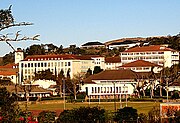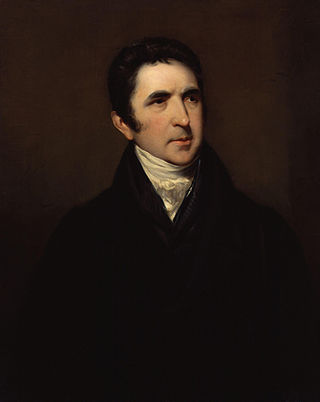
Sir John Barrow, 1st Baronet, was an English geographer, linguist, writer and civil servant best known for serving as the Second Secretary to the Admiralty from 1804 until 1845.
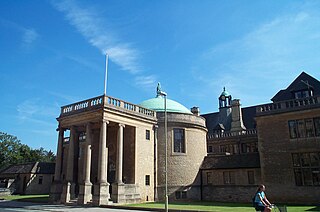
The Rhodes Scholarship is an international postgraduate award for students to study at the University of Oxford in Oxford, United Kingdom.

Lieutenant-General Sir Henry George Wakelyn Smith, 1st Baronet, GCB was a notable English soldier and military commander in the British Army of the early 19th century. A veteran of the Napoleonic Wars, he is also particularly remembered for his role in the Battle of Aliwal, India in 1846, his subsequent governorship of the Cape Colony, and as the husband of Lady Smith.
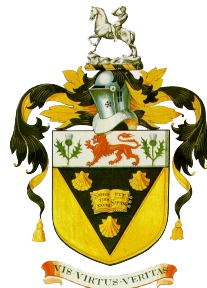
Rhodes University is a public research university located in Makhanda (Grahamstown) in the Eastern Cape Province of South Africa. It is one of four universities in the province.

Makhanda, formerly known as Grahamstown, is a town of about 75,000 people in the Eastern Cape province of South Africa. It is situated about 110 kilometres (70 mi) northeast of Gqeberha and 130 kilometres (80 mi) southwest of East London. It is the largest town in the Makana Local Municipality, and the seat of the municipal council. It also hosts Rhodes University, the Eastern Cape Division of the High Court, the South African Library for the Blind (SALB), a diocese of the Anglican Church of Southern Africa, and 6 South African Infantry Battalion. Furthermore, located approximately 3 km south-east of the town lies the world renowned Waterloo Farm, the only estuarine fossil site in the world from 360 million years ago with exceptional soft-tissue preservation.

Rayford Whittingham Logan was an African-American historian and Pan-African activist. He was best known for his study of post-Reconstruction America, a period he termed "the nadir of American race relations". In the late 1940s he was the chief advisor to the National Association for the Advancement of Colored People (NAACP) on international affairs. He was professor emeritus of history at Howard University.

Dame Flora Louise Shaw, Lady Lugard, was a British journalist and writer. She is credited with having coined the name Nigeria.

James Leonard Brierley Smith was a South African ichthyologist, organic chemist, and university professor. He was the first to identify a taxidermied fish as a coelacanth, at the time thought to be long extinct.
The Institute of Historical Research (IHR) is a British educational organisation providing resources and training for historical researchers. It is part of the School of Advanced Study in the University of London and is located at Senate House. The institute was founded in 1921 by A. F. Pollard.

The International Library of African Music (ILAM) is an organization dedicated to the preservation and study of African music. Seated in Grahamstown, South Africa, ILAM is attached to the Music Department at Rhodes University and coordinates its Ethnomusicology Programme which offers undergraduate and post-graduate degrees in Ethnomusicology that include training in performance of African music. ILAM, as the largest repository of indigenous African music, is particularly known for its study of the lamellophone mbira of Zimbabwe and Mozambique, as well as the Chopi people's Timbila, a variant of the marimba from southern Mozambique.
Randlords were the capitalists who controlled the diamond and gold mining industries in South Africa from the 1870s up to World War I.
Kogila Moodley is a published academic and sociologist at the University of British Columbia, where she was the first holder of the David Lam Chair of Multicultural Studies. She serves on the board of directors of the International Sociological Association's Race Relations Committee, and was its President from (1998–2002).
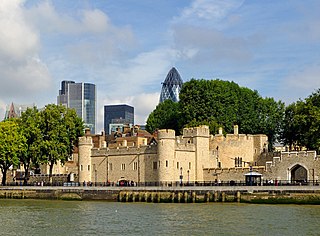
Historical sociology is an interdisciplinary field of research that combines sociological and historical methods to understand the past, how societies have developed over time, and the impact this has on the present. It emphasises a mutual line of inquiry of the past and present to understand how discrete historical events fit into wider societal progress and ongoing dilemmas through complementary comparative analysis.

The Albany Museum, South Africa is situated in Grahamstown in South Africa, is affiliated to Rhodes University and dates back to 1855, making it the second oldest museum in South Africa.

Rhodes House is a building part of the University of Oxford in England. It is located on South Parks Road in central Oxford, and was built in memory of Cecil Rhodes, an alumnus of the university and a major benefactor. It is listed Grade II* on the National Heritage List for England.

Sir George Edward Cory, was an English-born South African chemist and historian, best known for his six-volume publication "The Rise of South Africa".

Mike Berning was a South-African Librarian, author, and bell ringer. He is best known as a Head of Cory Library (1965) and Deputy University Librarian.
The Rhodes University Library is a library located in Makhanda, under the Makana municipality. It was initially established in 1937 in the Clock Tower building of Rhodes University College.
Tebello Nyokong is a South African chemist and distinguished professor at Rhodes University, and a recipient of South Africa's Order of Mapungubwe. She received the L’Oréal-UNESCO Award for Women in Science representing Africa and the Arab States in 2009, the South African Chemical Institute Gold Medal in 2012, and was named one of the Top 10 Most Influential Women in Science and Technology in Africa by IT News Africa. She is currently researching photo-dynamic therapy, an alternative cancer treatment method to chemotherapy. In 2007, she was one of the top three publishing scientists in South Africa, and in 2013 she was awarded the National Research Foundation's Lifetime Achievement Award.
Catriona Ida Macleod is a South African researcher. She is a distinguished professor of psychology, SARChI Chair of Critical Studies in Sexualities and Reproduction, and previous Head of the Psychology Department at Rhodes University. Her research focuses on sexual and reproductive health and feminist theory in psychology. Her book "Adolescence", Pregnancy, and Abortion: Constructing a threat of degeneration received the Distinguished Publication Award by the Association for Women in Psychology. Since 2013, she has been editor-in-chief of the international journal Feminism & Psychology.














